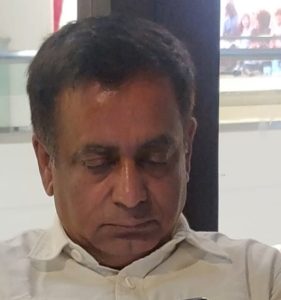Times are a-changing -the emerging multipolar world order
Cataclysms inevitably transform national and international political structures. The case in point is the black death (14th-17th centuries) and the two world wars. This is the first part of a two-part analysis of the potential transformations of international and national order. Delhi-based political commentator and analyst Kumar Sanjay Singh focuses on the possibilities of covid19 impelled transformations of the international order.
![Cataclysms inevitably transform national and international political structures. The case in point is the black death (14th-17th centuries) and the two world wars. This is the first part of a two-part analysis of the potential transformations of international and national order. Delhi-based political commentator and analyst Kumar Sanjay Singh focuses on the possibilities of covid19 impelled transformations of the international order. WHILE REDUCTION OF US FOOTPRINT IN international political and economic institutions under Trump-dictated isolationism predates covid19 pandemic, defiance of […]](https://www.theworldsikhnews.com/wp-content/uploads/2020/05/G7-German-government-handout-photo-of-Merkel-Trump-and-Macron-360x240.jpg)
WHILE REDUCTION OF US FOOTPRINT IN international political and economic institutions under Trump-dictated isolationism predates covid19 pandemic, defiance of US sanctions by allies is a direct outcome of the contagion-driven reality of self-preservation.
US-imposed sanctions notwithstanding, Latin American and European allies sought Cuban medical assistance. Similarly imperative of containing contagion in Iran from spreading beyond its borders led to substantial aid from the EU and UK. In a rare rebuff, western allies have been reluctant to accept US assertions on Chinese conspiracy behind the spread of covid19 on the ground of inadequate evidence.
Contagion-impelled race for vaccine suggests the emergence of three significant blocs:
1. US which is seeking to pursue an isolationist path. As per a report in NYT, there’s considerable apprehension amongst it’s NATO allies that in order to bolster its vaccine research capability, US may poach on European pharmaceutical companies.
2. The China-driven block which includes Russia, Pakistan and Iran. In addition, this block has a significant medical tie-up with Cuba and Australia.
3. The initiative led by the European Union, which has the support of Canada and Mexico. Even, UK has stakes in this initiative.
Relations between the member countries of each bloc and the potential tie-ups between the blocs will shape the emerging multipolar world order. Sino-US acrimony over the source of contagion and for control and distribution of vaccine makes any cooperation between the two difficult.
The situation is much more fluid with respect to the EU. For one, significant asymmetries exist between the member countries. Germany continues to be a powerhouse and in March 2020 it used it to its advantage by indulging in unilateralism to secure first right over its medical supplies. So did France.
Relations between the member countries of each bloc and the potential tie-ups between the blocs will shape the emerging multipolar world order.
Furthermore, the bloc pulls in opposite directions on the question of a tie-up with the other two blocs. UK would prefer a trans-Atlantic tie-up. Germany, on the other hand, has deep depends on Russia for gas/energy security. Given that the contagion-driven financial crunch will hit renewable energy sector much harder than the more stable carbon energy based sector, German dependence on Russia will only increase. Whether UK successfully pulls Europe with it or it breaks away from Europe will depend on the timing and success of its vaccine program vis-a-vis the European program.
US dominance over the world order depends on how quickly it emerges from the contagion-driven recession. Evidence suggests that here it lags behind not only China but also Europe.
Its success is also contingent on the success of its vaccine program. It is already evident that West Asian power-houses are expressing willingness to bankroll any country or bloc with a credible vaccine program. Understandably so, since energy and finance, the cornerstones of West Asia’s wealth, have been the worst hit. US dominance in the post-Bretton woods world being premised on its control over petroleum-producing nations; the drift of West Asia would seriously compromise America’s stature as a world power.
US dominance over the world order depends on how quickly it emerges from the contagion-driven recession.
Portents for the US are unsavoury if not ominous as the plummeting oil prices and the resultant bankruptcies in the US oil industry has soured US-Saudi relations. There are reports of the US shifting its batteries of patriot defence systems and air force cover from Saudi Arabia.
In this new dynamic is it wise to stake all our eggs in the American basket?
Title Photo: This is a photo by Jesco Denzel for the German government, showing a group of leaders at the Group of Seven summit, including German Chancellor Angela Merkel and President Trump, in Canada on June 9, 2018. The photo officially shared by the German Chancellor is symptomatic of the emerging world political multipolar order.
 Kumar Sanjay Singh is Associate Professor in the Department of History at the Swami Shraddhanand College, University of Delhi with specialisation in Mutations in Indian State formation post-1947, Extraordinary laws especially Internal Security Legislations and Human Rights with special focus on Northeast India and Adivasi society.
Kumar Sanjay Singh is Associate Professor in the Department of History at the Swami Shraddhanand College, University of Delhi with specialisation in Mutations in Indian State formation post-1947, Extraordinary laws especially Internal Security Legislations and Human Rights with special focus on Northeast India and Adivasi society.
